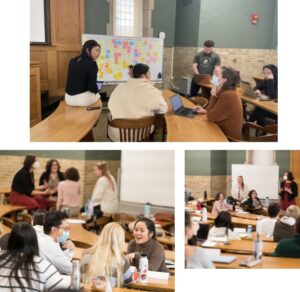The Human Trafficking Lab
Human Trafficking Lab is a social justice innovation space where multidisciplinary student teams use design thinking to research, incubate, and build replicable, scalable, and disruptive solutions to reduce vulnerability to trafficking.
About the Human Trafficking Lab
We are an interdisciplinary, social justice innovation space at the University of Michigan.
The Human Trafficking Lab is a social justice innovation space where multidisciplinary student teams use design thinking to research, incubate, and build replicable, scalable, and disruptive solutions to reduce vulnerability to trafficking. The Lab’s partnership with the Human Trafficking Clinic–which provides direct legal representation to survivors–helps to ensure the work in the Lab is informed by the lived-experience of survivors of trafficking.
Although housed at UM’s Law School, the Lab believes the law is an incomplete, imperfect solution to reducing exploitation and that interdisciplinary, cross-industry collaboration is necessary. Thus, the Lab is geared towards creating systems-level change at policy, service, and industry levels through collaborative partnerships across the nonprofit, corporate, and governmental sectors.

Current Projects
The Lab takes an expansive approach to addressing vulnerability. As such, projects cover a wide range of topics over six general themes.
Non-Punishment Principle
NPP in the Justice System
What happens when victims of trafficking are treated as offenders in the justice system? How do we consider the Non-Punishment Principle? How should society, policy, the press, and the legal system handle these situations?
Supply Chain & Forced Labor
Worker-Led Approach to Combatting Forced Labor in Supply Chains
This project works to respond to create long-term worker-led oversight of this supply chain to reduce labor trafficking.
Close the Ports?
Revived enforcement of Section 307 of the 1930s Tariff Act allows Customs and Border Patrol to seize goods made with forced labor and stop them from entering the US. How might Section 307 enforcement tools impact goods coming into the US?
Misinformation
Innocence Lost
What happens when human trafficking raids only end in “misinformative” and misleading headlines? What harm is caused by this? How do we hold law enforcement and the media accountable for the misinformation and harm created by this approach?
Right To Be Forgotten
Online Privacy
Even long after their trafficking ends, information about survivors can linger online (i.e., news articles, commercial sex ads, arrest records) that impacts their job prospects, safety, and privacy. What tools are available, and what solutions can we devise to improve online data privacy for survivors?
Access to Justice
The Last Mile
The legal system has failed to help individuals erase their criminal records when eligible. Expungement can open up access to schooling, employment, civil society benefits, and more. The law has proven to be an imperfect and all too narrow solution. How might we certify individuals outside the legal profession to help vulnerable individuals expunge their records?
Reparations
The Journey Towards Reparations in MI
How might we compensate for harm done in previous generations? Who should be involved in these decisions? What factors should we consider? Currently, we are focusing on what reparations might be possible in Michigan.
Our Commitment to Stakeholders
If these projects interest you, join us in the lab as a stakeholder!
This year alone, the Lab has worked with more than 50 stakeholders (from 20-minute calls to robust, long-term, mutually beneficial partnerships). We believe this work must be done in collaboration and community to be effective and impactful.
The Lab is committed to connecting and engaging with stakeholders in a supportive, non-extractive, and sustainable manner that neither taxes nor burdens their resources. Our projects are not limited by the semester framework, as we pass them from student team to student team until they reach actualization and implementation. Therefore, our stakeholders can trust that their contributions and partnerships will not fall by the wayside when the semester ends.
Join UsThe Lab’s Impact
The Lab is committed to creating an actionable impact in the community and developing data-driven measures for success and growth.
Would you like to join us in our work to address vulnerability to Human Trafficking?
We always seek partnerships with students, individuals, organizations, and companies that are committed to our shared cause.
How the Lab Works
In the lab, students from across the University of Michigan work in multidisciplinary teams to devise potential solutions to reducing vulnerability to human trafficking. Our Lab/course is not limited by the semester system, as projects are passed off from term to term until they are ready for implementation.
Unique Course Model
Our course (3 credits) prioritizes problem-solving and collaboration, influenced by socially engaged design thinking principles. The work is student-led and always multi-disciplinary.
Real Projects. Real Implementation.
Unlike a traditional project-based graduate course, our projects are not only based on real-world issues but are also devised actually to be implemented in the community with our partners.
Student-Led & Student-Identified Work
In the lab, students work with instructors and partners to identify the most pressing issues impacting vulnerability today. Students always have a say in the direction of their projects.
Trauma and Survivor Informed
The Lab’s partnership with the Human Trafficking Clinic–which provides direct legal representation to survivors–helps to ensure the work in the Lab is informed by the lived experience of survivors of trafficking.
For Students
Each semester the Lab accepts applications from graduate and professional students from the University of Michigan to enroll in our 3 credit course. Every discipline has something to contribute to this work. Join us!
Your work makes a difference.
Our projects in the lab have a real-world impact.
Any School, Any Program
We seek to include students in every discipline possible– from Social Work to Law to Computer Engineering!
Capped at 35 students per semester
We believe the learning environment makes a difference; therefore, we strive to cultivate an intimate and collaborative learning space.
Real world experience to add to your resume
We pride ourselves on offering our students the opportunity to gain tangible skills while working on projects that will benefit them as they transition into the workforce.
Are you a graduate student at the University of Michigan interested in enrolling in our one-semester, 3-credit course?
Learn MoreOur Team




